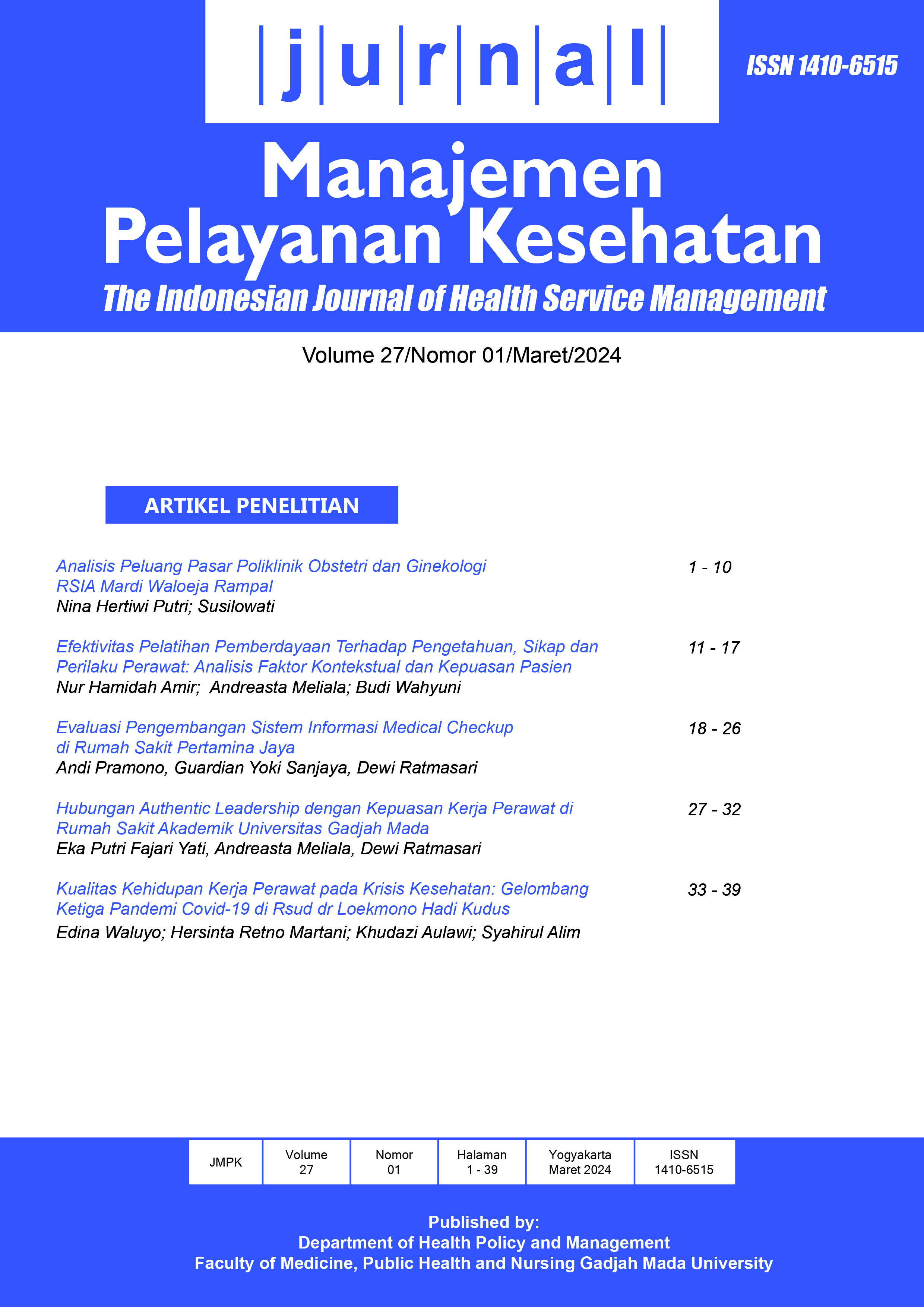KUALITAS KEHIDUPAN KERJA PERAWAT PADA KRISIS KESEHATAN: PANDEMI COVID-19 DI RSUD DR LOEKMONO HADI KUDUS
Abstract
Background: World Health Organization (WHO) stated that COVID-19 pandemic is a global health crisis which has affected health care sector. Nurse, as one of health care worker, had been affected by this crisis. The International Council of Nurses showed that the conditions of the COVID-19 pandemic had exacerbated the global shortage of nurses while many studies have reported that the COVID-19 pandemic has had a negative impact on the psychological well-being of nurses. However, Quality of Nursing Work Life (QNWL) study that focus on the psychological aspects in the domain of trust, care, respect, learn, and contribute have not been widely used.
Objectives: This study aimed at describing QNWL focusing on psychological aspect with the domains of trust, care, respect, learn, and contribute during the COVID-19 pandemic in dr. Loekmono Hadi Kudus Hospital from April to May 2022.
Methods: This study was a descriptive quantitative research with cross-sectional design. The study used total sampling technique with the number of respondents of 347 nurses (94% response rate). QNWL was measured using the QNWL Questionnaire by Utami et al. (2018) and analyzed univariately.
Results: The majority of respondents had a high QNWL, but the age of 46-55 years had lowest QNWL in high category (57% of respondent). Domains with high QNWL above 90% were trust, care, and respect and domains with high scores below 90% were learn and contribute.
Conclusions: The QNWL level in dr. Loekmono Hadi Hospital fro April to May 2022 period was high.
References
2. Utami, U., Kusnanto, H., Riyono, B. & Alim, S. The validity and reliability of quality of nursing work life instrument for hospital nurses. J. Ners 13, 227–232 (2018).
3. Brooks, B. A. & Anderson, M. A. Defining quality of nursing work life. Nurs. Econ. 23, 319–326 (2005).
4. Hsu, M. Y. A quality of working life survey instrument for hospital nurses. J. Nurs. Res. 24, 87–99 (2016).
5. Raeissi, P., Rajabi, M. R., Ahmadizadeh, E., Rajabkhah, K. & Kakemam, E. Quality of work life and factors associated with it among nurses in public hospitals, Iran. J. Egypt. Public Health Assoc. 94, (2019).
6. An Le, T. H., Trang Nguyen, T. M., Trinh, T. A. & Phuong Nguyen, T. H. Factors Affecting Quality of Working Life: A Study on Front-line Employees in Vietnamese Aviation Sector. Transp. Res. Procedia 56, 118–126 (2021).
7. Hemanathan, R., Sreelekha, Prakasam, P. & Golda, M. Quality of work life among nurses in a tertiary care hospital. JOJ Nurse Heal. Care 5, 1–8 (2017).
8. Kheiri, M. et al. Factors affecting the quality of work-life of nurses: a correlational study. J. Res. Nurs. 26, 618–629 (2021).
9. MacKinnon, D. & Derickson, K. D. From resilience to resourcefulness: A critique of resilience policy and activism. Prog. Hum. Geogr. 37, 253–270 (2012).
10. Inocian, E. P. et al. Professional quality of life and caring behaviours among clinical nurses during the COVID-19 pandemic. J. Clin. Nurs. 00, 1–13 (2021).
11. Sun, B., Fu, L., Yan, C., Wang, Y. & Fan, L. Quality of work life and work engagement among nurses with standardised training: The mediating role of burnout and career identity. Nurse Educ. Pract. 58, 103276 (2022).
12. Farhadi, A., Bagherzadeh, R., Moradi, A., Nemati, R. & Sadeghmoghadam, L. The relationship between professional self-concept and work-related quality of life of nurses working in the wards of patients with COVID-19. BMC Nurs. 20, 1–8 (2021).
13. Maqsood, M. B. et al. Assessment of quality of work life (QWL) among healthcare staff of intensive care unit (ICU) and emergency unit during COVID-19 outbreak using WHOQoL-BREF. Saudi Pharm. J. 29, 1348–1354 (2021).
14. Nikeghbal, K., Kouhnavard, B., Shabani, A. & Zamanian, Z. Covid-19 effects on the mental workload and quality of work life in Iranian nurses. Ann. Glob. Heal. 87, (2021).
15. Lai, J. et al. Factors associated with mental health outcomes among health care workers exposed to Coronavirus Disease 2019. JAMA Netw. Open 3, e203976–e203976 (2020).
16. Tolksdorf, K. H., Tischler, U. & Heinrichs, K. Correlates of turnover intention among nursing staff in the COVID-19 pandemic: a systematic review. BMC Nurs. 21, 1–17 (2022).
17. Bayer, N., Golbasi, Z., Uzuntarla, Y. & Akarsu, K. Job satisfaction, burnout and turnover intention of nurses working in hospital during the pandemic COVID-19 in Turkey. J. Clin. Med. Kazakhstan 18, 69–75 (2021).
18. Lou, N. M. et al. Nurses’ and Physicians’ Distress, Burnout, and Coping Strategies During COVID-19: Stress and Impact on Perceived Performance and Intentions to Quit. J. Contin. Educ. Health Prof. 42, E44–E52 (2022).
19. de Cordova, P. B. et al. Burnout and intent to leave during COVID‐19: A cross‐sectional study of New Jersey hospital nurses. J. Nurs. Manag. 1–9 (2022) doi:10.1111/JONM.13647.
20. International Council of Nurses. Invest in nursing and respect rights to secure global health. Nurses: A Voice to Lead 1–57 (2022).
21. Kementerian Kesehatan Republik Indonesia. Positivity Rate Kasus Omicron Melandai. Rilis Sehat https://sehatnegeriku.kemkes.go.id/baca/rilis-media/20220222/0339374/positivity-rate-kasus-omicron-melandai/ (2022).
22. Centers for Disease Control and Prevention. Omicron Variant: What You Need to Know. Your Health https://www.cdc.gov/coronavirus/2019-ncov/variants/omicron-variant.html (2022).
23. Kementerian Kesehatan Republik Indonesia. Kemenkes Minta Dinkes dan Direktur Rumah Sakit Antisipasi Kekurangan Tenaga Kesehatan Akibat Omicron – Sehat Negeriku. Rilis Sehat https://sehatnegeriku.kemkes.go.id/baca/rilis-media/20220213/4839303/kemenkes-minta-dinkes-dan-direktur-rumah-sakit-antisipasi-kekurangan-tenaga-kesehatan-akibat-omicron/ (2022).
24. Veda, A. & Roy, R. Occupational Stress Among Nurses: A Factorial Study with Special Reference to Indore City. J. Health Manag. 22, 67–77 (2020).
25. Navales, J. V., Jallow, A. W., Lai, C. Y., Liu, C. Y. & Chen, S. W. Relationship between quality of nursing work life and uniformed nurses’ attitudes and practices related to COVID-19 in the Philippines: a cross-sectional study. Int. J. Environ. Res. Public Health 18, 9953 (2021).
26. Nikitin, J. & Freund, A. M. The adaptation process of aging. in The Cambridge Handbook of Successful Aging (eds. Fernandez-Ballesteros, R., Robine, J. M. & Benetos, A.) 281–298 (Cambridge University Press, 2019). doi:10.1017/9781316677018.018.
27. Yayla, A. & İlgin, V. E. The relationship of nurses’ psychological well-being with their coronaphobia and work–life balance during the COVID-19 pandemic: A cross-sectional study. J. Clin. Nurs. 30, 3153–3162 (2021).
28. Poortaghi, S. et al. Evolutionary concept analysis of health seeking behavior in nursing: A systematic review. BMC Health Serv. Res. 15, 1–8 (2015).
29. Beller, J., Kuhlmann, B. G., Sperlich, S. & Geyer, S. Secular Improvements in Cognitive Aging: Contribution of Education, Health, and Routine Activities: https://doi-org.ezproxy.ugm.ac.id/10.1177/08982643211065571 2022, 1–11 (2022).
30. Benner, P. From Novice to Expert. Am. J. Nurs. 82, 402–407 (1982).
31. Howie-Esquivel, J., Byon, H. Do, Lewis, C., Travis, A. & Cavanagh, C. Quality of work-life among advanced practice nurses who manage care for patients with heart failure: The effect of resilience during the Covid-19 pandemic. Hear. Lung 55, 34–41 (2022).
32. Satuan Tugas Penanganan COVID-19. Analisis data COVID-19 mingguan: Update per 11 Juli 2021. https://drive.google.com/file/d/1NiLdOAA1wZCiJRQ8V-X4zs4FzOIXEmOz/view?usp=sharing%0A (2021).
33. Weaver, S. H., de Cordova, P. B., Ravichandran, A. & Cadmus, E. Nursing Activities and Job Satisfaction of the Licensed Practical Nurse Workforce in New Jersey. J. Nurs. Regul. 13, 13–21 (2022).
34. Jones, J. & Barry, M. M. Factors influencing trust and mistrust in health promotion partnerships. Glob. Health Promot. 25, 16–24 (2018).
35. Sutherland, B. L., Pecanac, K., LaBorde, T. M., Bartels, C. M. & Brennan, M. B. Good working relationships: how healthcare system proximity influences trust between healthcare workers. J. Interprof. Care 36, 331–339 (2022).
36. Wang, Y. et al. Research on the formation of humanistic care ability in nursing students: A structural equation approach. Nurse Educ. Today 86, 104315 (2020).
37. Moudatsou, M., Stavropoulou, A., Philalithis, A. & Koukouli, S. The Role of Empathy in Health and Social Care Professionals. Healthc. 2020, Vol. 8, Page 26 8, 26 (2020).
38. Rahman, A. A scoping review of COVID-19-related stress coping resources among nurses. Int. J. Nurs. Sci. 9, 259–267 (2022).
39. Ahlstedt, C., Eriksson Lindvall, C., Holmström, I. K. & Muntlin Athlin, Å. What makes registered nurses remain in work? An ethnographic study. Int. J. Nurs. Stud. 89, 32–38 (2019).
40. Rabiul, M. K., Promsivapallop, P., Al Karim, R., Islam, M. A. & Patwary, A. K. Fostering quality customer service during Covid-19: The role of managers’ oral language, employee work engagement, and employee resilience. J. Hosp. Tour. Manag. 53, 50–60 (2022).
41. Tao, W., Lee, Y., Sun, R., Li, J. Y. & He, M. Enhancing Employee Engagement via Leaders’ Motivational Language in times of crisis: Perspectives from the COVID-19 outbreak. Public Relat. Rev. 48, 102133 (2022).
42. Baysal, H. Y. & Yildiz, M. Nursing’s job life quality’s effect on job satisfaction. Int. J. Caring Sci. 12, 1–8 (2019).
43. Dhamija, P., Gupta, S. & Bag, S. Measuring of job satisfaction: the use of quality of work life factors. Benchmarking An Int. J. 26, 871–892 (2019).
44. Boro, M. F. V., Rahman, L. O. A. & Nurdiana. Optimalisasi Fungsi Staffing Kepala Ruangan dalam Penjadwalan Waktu Kerja dan Istirahat Untuk Mengurangi Workload pada Perawat Pelaksana di Masa Pandemi. J. Telenursing 3, 456–469 (2021).
45. Nashwan, A. J., Abujaber, A. A., Mohamed, A. S., Villar, R. C. & Al-Jabry, M. M. Nurses’ willingness to work with COVID-19 patients: The role of knowledge and attitude. Nurs. Open 8, 695–701 (2021).
46. Specht, K. et al. Frontline nurses’ experiences of working in a COVID-19 ward–A qualitative study. Nurs. Open 8, 3006–3015 (2021).
47. Costa, T., Silva, I. A., Peres, H. H. C., Duarte, E. D. & Bueno, M. Nurses’ motivation, knowledge, and satisfaction with a neonatal pain assessment e-learning course. Pain Manag. Nurs. (2022) doi:10.1016/j.pmn.2022.05.002.
48. Duarte, I. et
Copyright (c) 2024 Syahirul Alim, Edina Waluyo, Hersinta Retno Martani, Khudazi Aulawi

This work is licensed under a Creative Commons Attribution-NonCommercial-ShareAlike 4.0 International License.




